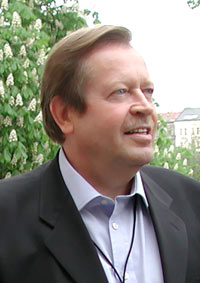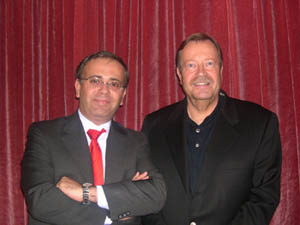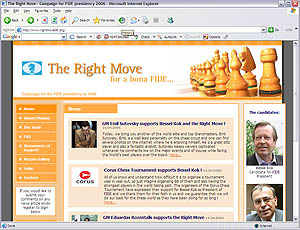 |
 |
 |
 |
 |
 |
 |
 |
 |
 |
 |
 |
 |
 |
 |
 |
 |
 |
 |
 |
 |
|
|
|
|
|
|
|
|
|
|
|
|
|
|
|
|
|
|
|
|
|
|
|
 |
|
|
|
|
|

|
|
|
|
|
|
|
|
|
At the 2006 Olympiad in Turin, Italy, the General Assembly comprised of FIDE member nations will vote for one of two parties for leadership in the chess body. Bessel Kok, a Dutch businessman, is running against the incumbent, Kirsan Ilyumzhinov.
Recently there have been barbs exchange between different elements of the two parties and a number of interviews have been granted. The Chess Drum's Daaim Shabazz requested an interview with "The Right Move's" Bessel Kok and shortly thereafter, he acquiesced.
The interview placed particular emphasis on Kok's background, FIDE's organizational implementation and the plight of developing federations in the chess world. The latter question comes as one of the main concern of developing federations and has been asked in other interviews.
In the next two months, both parties will be jockeying for position to convince federations around the world that they hold the key to moving the chess agenda forward.
|
|
|
|
|
|
|
|

|
|
|
|
|
|
|
|
|
|
|
|
|
|
|
|
Bessel Kok: Well, I would like to start with a not so small correction. You will have seen from the article "A trip down memory lane" on the Right Move website that the direction was not devised by Kirsan but by our hard working friends. This is unfortunately one of the biggest weaknesses in FIDE today which has absolutely no vision and struggles from one decision to another.
The reason we were a bit vague is that we literally do not want to give any more material to our opposition since they are void of ideas. Makropoulos came to Birmingham with a small hand written piece of paper with ideas which resembled very closely the ones we had published on our website !
However we have now been campaigning in "one-on-one meetings" on a number of initiatives which we believe will be fundamental to really addressing the issues facing developing countries. By "developing" we do not mean this in terms of the IMF (International Monetary Fund) but purely in chess terms based on :
How many members does a Federation have? How many schools have chess as part of the curriculum? How many rated players? How many titled players? How many trainers? How many arbiters? What is its financial position? What relationship does it enjoy with its Ministry of Sport or its National Olympic committee?
Clear development goals need to be agreed intelligently with Federation, Zonal and the Continental President. GM Nigel Short and our Campaign Director, Geoffrey Borg have also been communicating and visiting countries in Africa and the Caribbean to explain our vision and direction and also discuss our development plans and ideas directly with them.
TCD: If you are victorious, will staffing decisions be a part of your initiative to address the lack of development of smaller federations?
Bessel Kok: One of the ideas we have is to get closer to developing Federations and the world is just too big to try and run it solely from Athens or Kalmikia. It is also important to have an easily accessible FIDE and to find people who are willing to listen and help. The number of people who do this today in FIDE can be counted on the fingers of one hand !
TCD: There are many talented players around the world who struggle to get invitations and recognition. For example, most did not know of Robert Gwaze (Zimbabwe) until he went 9-0 on board #1 in the 2002 Olympiad in Bled. In addition, South Africa's Watu Kobese and Zambia's Amon Simutowe have been top players in Africa for a long time, both pursuing the GM title. In the U.S. I personally know talented U.S. players such as Emory Tate and Stephen Muhammad who are in the same situation. In the Caribbean much of the talent has been untapped. What is your thought of a Grandmaster Developmental Institute to provide financial assistance and training for those identified (by an application process) with the potential to become Grandmasters? Please elaborate.
Bessel Kok: An important foundation of chess development is the educational program for chess in schools. This will start to widen the base within all developing countries where it may be introduced. The use of internet will also be a massive breakthrough in providing training to aspiring chess players.
Rather than zoom in on GMs we prefer to look at the provision of a platform where any person who wants to take up chess as a profession will have the opportunity to do so but he / she must be professional and competent. This means adequate certification. Another key weakness is the costs normally associated with getting GM or IM titles and this is compounded by a lack of tournaments in developing countries.
The Right Move is offering, as part of its development program, 40 invitations per continent per annum to players covering board, accommodation and tournament expenses in Europe and the United States. The objective is to give players in developing nations a chance to get international experience and norms. These invitations will be discussed with Continental Presidents and allocated on a fair, rotating basis.
TCD: The granting of automatic titles (as opposed to three norms) in Zonal events have been criticized and aimed at zones of developing regions. What is your view on getting automatic titles in Zonal events and do such practices dilute the prestige of chess titles?
Bessel Kok: This idea was introduced around 20 years ago and let us review what it has done for chess in developing nations actually. Has it increased the number of actual players playing? Has it meant more revenue for the national chess Federation Why are we in such a dire situation in so many nations in Africa and the Americas today? The reason is that just giving a title without a real program for development will get us nowhere.
I think that the title and zonals are a good idea but the execution and follow up have lacked any form of enthusiasm or direction on the part of FIDE. What are the plans in terms of rated players for countries in Africa or the Caribbean? What are the plans for chess in schools? How many members would we like to have? When have there been meetings with Ministries of Education, Youth or Sport in these nations to discuss achievable programs?
TCD: What has been one of the main failures of FIDE in the last ten years?
Bessel Kok: We give more the impression of a 'smash and run' strategy today. We go into a country, get political sponsorship, do some business deals unrelated to chess and then leave … we have no idea of long term relationship or strategy. For a game which is the epitomy of strategy, this is the biggest failing of FIDE today.
TCD: What has been one of the main accomplishments of FIDE in the last ten years?
Bessel Kok: Difficult to say since despite all the money Kirsan has allegedly put into chess, FIDE does not even own its own premises today, we have a schism in the World Championship, the best player has left chess and we have a huge apathy in FIDE administration.
TCD: What is your 5-year marketing plan to popularize chess worldwide?
Bessel Kok: We have devised a strategic plan for 2006-2010 with clear ideas and proposals which we will put to the General Assembly (GA) in Turin. This will be discussed and approved by the GA and will serve as the platform to direct a future FIDE.
TCD: Thank you for taking time out of your busy schedule to address the Drum audience!
Interview posted 24 April 2006
(Other interviews available here)
|
|
|
|
|
|
|
|
|
|
|
|
TCD: Mr. Kok, tell us a bit about your professional background.
Bessel Kok: I was a co-founder of S.W.I.F.T in Belgium, (Society for World Wide Interbank Telecommunication) International Banking Network which today provides payment services to 110000 banks in 124 countries. From 1980 to 1989 I was appointed President and CEO of S.W.I.F.T - Brussels with around 1,200 employees. I then was requested by the Belgian Government to run Belgacom (The Belgian National Telecom Operator) and I spent six years there between 1989 and 1995 also as President and CEO. My mission there was to transform the Belgian RTT state administration (26,000 staff) and prepare it for privatization.
Then in 1995 I joined Cesky Telecom as Vice Chairman and Chief Operating Officer and also was the Rotating Chairman of Eurotel (Czech mobile operator with 4,5 million customers). I remained there till February 2004. After this I took up a role as an advisor with Morgan Stanley in the Czech Republic and from January 2005 I was the Chairman of Scarlet Telecommunications group Holland / Belgium. I also hold the following distinctions:
|
|
|
|
|
|
|
|
|
|
|
|
|
Member of the Board of Vaclac Havel Foundation
Organizer of Cow Parade Prague 2004 (largest art exhibition ever held in Czech Republic)
Advisory member of Film Studio Verein Babelsberg-Berlin
Producer of Film Nicholas Winton, the power of Good - Emmy Award 2002
Chairman of World Chess Grandmaster Association from 1985 till 1991
|
|
|
|
|
|
|
|
|
|
|
|
|
From my résumé you will see that music, films and chess have played a very motivating part in my life. I enjoy culture and chess has always been an integral part in my life. These last twenty years, unfortunately we have missed out on great opportunities to improve the image of the game and in an ever increasing competitive society, instead of putting more professional management in place to compete against videogames, satellite television, internet gaming we have continued to meander without any real direction.
|
|
|
|
|
|
|
|
|
|
|
|
|
TCD: After such a distinguished career, what subsequently led you into chess promotion?
I became interested in Chess Promotion when I was CEO of SWIFT and looking for an original way of positioning this fast growing company in Belgium in the early eighties. One of our employees proposed to organize some (small) Chess tournaments. I agreed on the condition that we would do it "different"... With the advisers John van der Wiel and Jan Timman we wrote a Q & A called: What is the perfect tournament in the eyes or a Grandmaster? It became the birth of the first S.W.I.F.T tournament in Brussels where we had days of more than 1000 spectators.
TCD: Can you explain to us why you selected your running mate, Ali Nihat Yazici?
Bessel Kok: I met Ali Nihat the first time in Dresden 2005 and we got along tremendously well. Ali Nihat has a great vision of chess development, is a hard worker, great on use of information technology as a means rather than an end and more importantly, in a very short time he has an impressive track record of results achievement.
|
|
|
|
|
|
|
|
|
|

|
|
|
|
|
|
|
|
|
|
Ali Nihat Yazici and Bessel Kok
"The Right Move"
|
|
|
|
|
|
|
|
|
|
|
|
|
TCD: Why did you pick this time in history to vie for the FIDE Presidency?
Bessel Kok: I can name a number of reasons. First, the decreasing lack of success that FIDE has had these last few years to attract public interest and corporate sponsors; second, to basically work again on a golden opportunity to reunify the Chess World after the efforts in Prague; third, the growing frustration of several hard working FIDE delegates with the slow pace in the changes that FIDE needs to become a modern sports Federation; fourth, the fact that I am semi-retired and have more time, and together with my colleague, Ali Nihat Yazici we wish to dedicate our energies and our love for chess to improving the situation we find ourselves in today.
TCD: You state in some of your documents that there is perceived ambiguity of who the World Champion is. You were supportive of Garry Kasparov's effort to break from FIDE to create the GMA, a chess entity which subsequently created a separate championship cycle. Four years ago, you were a part of the negotiations of the Prague Agreement designed to eliminate the separation. Do you believe you are obligated in this reunification process because of this history?
Bessel Kok: Gary and I never created the GMA to break away from FIDE. We created an Association of Professional Chess Players, created a World Cup Cycle, attracted major international sponsors and it was a great success. However Kasparov and I disagreed on an important issue regarding the direction of the GMA after 5 years of its existence, and the rest is history.
Regarding Prague Agreement, shortly afterwards, I met up with IMG, a large sports marketing company (e.g. Manchester United) and we drew up a business plan for them and FIDE using business consultants. We had met in London to discuss this plan and for a time afterwards we heard nothing.
It transpired that IMG and FIDE had bilateral discussions at the time and had decided to work out together an agreement without my group. Obviously there was a hidden agenda by some people to try and push Kirsan's infamous FIDE Commerce. Of course, since the agenda for FIDE commerce was different, subsequent discussions failed miserably and the whole thing collapsed. Further attempts to organise the reunification matches also were treated impolitely by FIDE despite the efforts made in Prague !
The result is well known to the chess world today but the biggest charade is that Kirsan's team is saying today "Where was Bessel Kok after Prague ?"
TCD: In the past, Kirsan Ilyumzhinov has prided himself on making chess more accessible to developing regions by holding major tournaments in each continent. In an interview conducted by Geoffrey Borg and Ali Nihat Yazici, he stated,
"We must get closer to each Federation, we have to strengthen our school activities, improve our technical and financial programs for less developed countries, draft marketing and advertising programs to attract sponsors."
In the recent Chess Today interview, you were asked how you were going to help federations in developing regions. The answer given was that you will take an assessment and ask federations what is needed "to get them on their own two feet." This response appears a bit vague and provides no specific plans for chess in the developing regions. Also in your mission statement on the Right Move website there is no mention of regional chess development. What are your specific plans for developing regions, particularly those in the Africa and the Caribbean?
|
|
|
|
|
|
|
|
|
|

|
|
|
|
|
|
|
|
|
|
|
|
|
|
|
|
 |
|
 |
|
|
|
|
|
|
|
|
|
|
|
|
|
|
|
|
|
|
|
|
|
|
|
|
|
 |
|